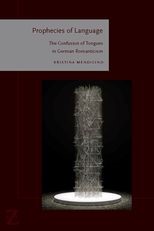 Prophecies of Language: The Confusion of Tongues in German Romanticism
Prophecies of Language: The Confusion of Tongues in German Romanticism
Contents
Empedocles, Empyrically Speaking—: Friedrich Hölderlin’s Tragic öde
Get access-
Published:December 2016
Cite
Abstract
This chapter focuses on the poetological prose texts and drafts that make up Friedrich Hölderlin’s unfinished tragedy, Empedocles. In line with Empedocles’ plunge into Aetna, these texts reflect attempts to translate, not a language, but a fire, which elemental force turns out to be both the precondition for speech and its preclusion. For Hölderlin, the tragic logos is the prophetic analogos that follows upon (ana) a moment of burning—be it the fire-sacrifices that a Greek mantic translates, the fires of Aetna, or the fiery “dissolution” of an entire fatherland. At the extreme, however, the language of Aetna’s flames is unspeakable. For beneath Aetna lies Zeus’ last Titanic rival, the fire-breathing Typhon, who has a hundred heads and at least as many tongues, as Hölderlin knew from Hesiod and Pindar. The pure possibility of tragic language is not an ideal totality, but a titanic one, in which all languages speak at once. And although Hölderlin would never complete his drama, its very inachievement demonstrates the perils of an experience of foreignness in language, where the limits and origins of speech are not only thought and spoken—but also silenced, dissolved, and disrupted, in their constitutive plurality.
Sign in
Personal account
- Sign in with email/username & password
- Get email alerts
- Save searches
- Purchase content
- Activate your purchase/trial code
- Add your ORCID iD
Purchase
Our books are available by subscription or purchase to libraries and institutions.
Purchasing information| Month: | Total Views: |
|---|---|
| August 2024 | 2 |
| January 2025 | 1 |
| February 2025 | 2 |


Get help with access
Institutional access
Access to content on Oxford Academic is often provided through institutional subscriptions and purchases. If you are a member of an institution with an active account, you may be able to access content in one of the following ways:
IP based access
Typically, access is provided across an institutional network to a range of IP addresses. This authentication occurs automatically, and it is not possible to sign out of an IP authenticated account.
Sign in through your institution
Choose this option to get remote access when outside your institution. Shibboleth/Open Athens technology is used to provide single sign-on between your institution’s website and Oxford Academic.
If your institution is not listed or you cannot sign in to your institution’s website, please contact your librarian or administrator.
Sign in with a library card
Enter your library card number to sign in. If you cannot sign in, please contact your librarian.
Society Members
Society member access to a journal is achieved in one of the following ways:
Sign in through society site
Many societies offer single sign-on between the society website and Oxford Academic. If you see ‘Sign in through society site’ in the sign in pane within a journal:
If you do not have a society account or have forgotten your username or password, please contact your society.
Sign in using a personal account
Some societies use Oxford Academic personal accounts to provide access to their members. See below.
Personal account
A personal account can be used to get email alerts, save searches, purchase content, and activate subscriptions.
Some societies use Oxford Academic personal accounts to provide access to their members.
Viewing your signed in accounts
Click the account icon in the top right to:
Signed in but can't access content
Oxford Academic is home to a wide variety of products. The institutional subscription may not cover the content that you are trying to access. If you believe you should have access to that content, please contact your librarian.
Institutional account management
For librarians and administrators, your personal account also provides access to institutional account management. Here you will find options to view and activate subscriptions, manage institutional settings and access options, access usage statistics, and more.